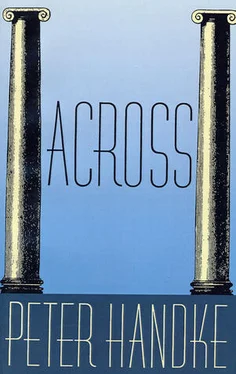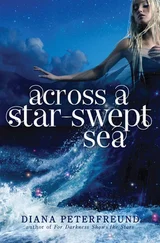Peter Handke - Across
Здесь есть возможность читать онлайн «Peter Handke - Across» весь текст электронной книги совершенно бесплатно (целиком полную версию без сокращений). В некоторых случаях можно слушать аудио, скачать через торрент в формате fb2 и присутствует краткое содержание. Год выпуска: 2000, Издательство: Farrar, Straus and Giroux, Жанр: Современная проза, на английском языке. Описание произведения, (предисловие) а так же отзывы посетителей доступны на портале библиотеки ЛибКат.
- Название:Across
- Автор:
- Издательство:Farrar, Straus and Giroux
- Жанр:
- Год:2000
- ISBN:нет данных
- Рейтинг книги:3 / 5. Голосов: 1
-
Избранное:Добавить в избранное
- Отзывы:
-
Ваша оценка:
- 60
- 1
- 2
- 3
- 4
- 5
Across: краткое содержание, описание и аннотация
Предлагаем к чтению аннотацию, описание, краткое содержание или предисловие (зависит от того, что написал сам автор книги «Across»). Если вы не нашли необходимую информацию о книге — напишите в комментариях, мы постараемся отыскать её.
Across — читать онлайн бесплатно полную книгу (весь текст) целиком
Ниже представлен текст книги, разбитый по страницам. Система сохранения места последней прочитанной страницы, позволяет с удобством читать онлайн бесплатно книгу «Across», без необходимости каждый раз заново искать на чём Вы остановились. Поставьте закладку, и сможете в любой момент перейти на страницу, на которой закончили чтение.
Интервал:
Закладка:
Then she replied: “You don’t seem to be wholly present; you breathe discontent. You’re kind of run-down. I desire you but I don’t trust you. You have something on your conscience; not theft, or you’d be on the run. It’s plain that you are outside ordinary law, and it makes you suffer in a way. I don’t trust you, and I do. You are like the man in the doorway. Though very ill, he went to see a good friend. In leaving, he stopped at length in the doorway and tried to smile; his tensed eyes became slits, framed in their sockets as by sharply ground lenses. ‘Goodbye, my suffering Chinaman,’ said his friend.”
“Did they ever see each other again?”
The portraitist said nothing more. Already in the doorway, her only reply was an immensely friendly laugh. I shut my eyes and heard a sort of answer after all: “In the end, the friend said to the friend, ‘At last a Chinese — at last a Chinese face among so many native faces.’”
That morning, I cut across the fields and visited my mother in Wals. She lives in an old people’s home on the large, almost always deserted village square. We sat together in the garden, on a wooden bench under a pear tree with pink-and-white blossoms.
At first she mistook me for the postman, and later she addressed me by various other names. From time to time she recognized me, and then she giggled, keeping her mouth closed to hide the stumps of her teeth. Her eyes were very bright, her face as small as a child’s, her head no bigger than a headhunter’s shrunken trophy. She was eating an Easter egg, more scraping than biting, and the painted shells fell into her lap; she gulped the whole yolk down at once. She studied me at length and then said: “Aren’t these cruel times we’re living in? Even before you went away to the army, I was always sorry for you.” She asked me how my “business,” as she called it, was getting along. “You and your business,” a traditional turn of phrase, which was not meant to be disparaging, but betokened a sort of respectful awe. And then another strange word fell: “If it weren’t for you, I’d be discomfited now.” Whom did she think she was talking to? Once, when she said: “When you were little, I often hit you with the cooking spoon,” she meant me. And later on, she again meant me when she said: “Your father and you are weavy people. You’re always weaving back and forth between home and somewhere else, and you don’t find your place either here or there.”
When in parting I put some money on the bench for her, she whooped several times for joy, and stomped around the bills in a heavy-footed dance, in which she was joined by some of the other female residents.
I then crossed the square to the church; in the memorial chapel there was a big book containing photographs of the war dead. My father was killed at the very beginning of the war and never saw his son. His picture, which is in a plastic sleeve, does not, like most of the others, show the dark stamplike mustache under the nose, but perhaps he was too young for that when the picture was taken.
From the church terrace, one looks down into the hollow where the Saalach forms the border with Germany — a cold mountain stream with broad gravel banks. One could skip flat stones into the bushes on the opposite bank. Everything in me shrinks back from the country on the far shore — as though that were the beginning of nothingness forever and ever.
That same evening, I stood beside another river. In the early afternoon, I had flown via Zurich to Milan, and from there taken a local train to Mantua. A few kilometers to the south, there is a village named Pietole, which was formerly called Andes and is believed to be Virgil’s birthplace. Past the village, behind a dike, flows the Mincio, which Virgil called “immense,” making its way “in slow meanders” through the Lombard lowlands, “its banks fringed with swaying reeds.” Today, according to certain editions of Virgil, the Mincio is little more than a brook. This, I saw when I got there, is not true; on the contrary, the river answers exactly to Virgil’s description of two thousand years ago. In places, it even separates into several arms, with wooded islands in between.
White water lilies with yellow centers rose and fell in the slow current. Little fishes leapt into the air. On one of the wooded islands, a cuckoo called, and a heron glided overhead. Far beyond the river, flames shot into the air from an oil refinery.
It was a warm, bright evening; there was no one about; but a walled-in dog pound gave forth a tumult as of different pieces of music being played backward; and when birds overflew this spot, they would dart vertically upward. I took my clothes off and waded up to my neck into the muddy-brown water.
After dressing again, I went westward into the village and sat down outside a restaurant, the Trattoria Andes. Situated at the intersection of two surfaced country roads, it is surrounded by a large cornfield; almost every one of the half-grown stalks had a sparrow perched on it. This Indian corn was unknown to Virgil, as were the potato plants in the neighboring field, not to mention the tomatoes and the “robinia with its soft little leaves, which rustle more loudly than those of any other tree” (my naturalist son).
On the way back to Mantua, I set off at random across the fields, which are traversed by a number of bridgeless canals. I jumped across most of them; only one was so wide that I had to swim (making a bundle of my clothes and tossing it ahead of me). The weed that we call bear’s-breech and feed to rabbits proved, on closer scrutiny, to be something much more choice, the “twining acanthus.” The elders here were diminutive. The plane trees, “which lend shade to those who stop to drink,” were clipped hedges along the sides of the road; the dried seedpods from the previous year rattled loudly at every gust of wind.
That night, I dreamed that the village of Andes was on a bay along the seacoast. In another dream, I saw my mother’s empty bed. Her nightgown was spread out on it; it showed the precise imprint of her bruised body.
Next morning, in Milan, I took a plane to Alghero in Sardinia. It was in Sardinia, in two successive summers, that I begot my children, and once from a passing ship I saw Alghero as a white city. Since then, the city has meant to me “not having to say anything,” “the possibility of keeping silent.” During the flight, the vacant sea sparkled, and once two ferries passed each other. After the plane landed, there were light-colored baggage checks fluttering on the loaded baggage trucks in the middle of the cement field.
I spent a whole day by the remote Lago di Barratz. Separated from the sea by an enormous dune, it is the only natural freshwater lake on the island. I was alone there. The only sign of other people were footprints. I stood barefoot in the water, over my ankles in black muck, until a tiny leech chewed itself into me, grew fat, and finally fell off. A grasshopper which was almost as big as a sparrow flew onto my hand and I held it between my fingers until its sawtooth legs began to scratch my skin. The shores of the lake were roofed over by tamarisk stalks the color of asparagus, but much taller; their green was in perfect balance with the rippling blue of the water: “the murmuring tamarisk.” In the background, on a sand-colored high plateau, a dark bull stood motionless for hours. On the way back to the bus stop, I saw the stone I had killed with lying limestone-gray in the red dust; the round holes in it were my finger marks. I was still walking barefoot, and in the village a child called out to me: “You got no shoes on,” and the words became a chorus.
The next day — I should have been back in Salzburg teaching — I passed the home for the so-called retarded in Alghero, which is separated from the sea by a shore road and is called Domus Misericordiae. Nearly all the idiots, young for the most part, were sitting on a long bench in the yard, with their backs to the road; a few sat on the gateposts, looking down at the passersby. One held his fingers to his lips like a Jew’s harp and struck them soundlessly. I ventured a look at him. But the idiot on the gatepost won; I lowered my eyes and went away. Toward evening, I went back and again faced the Jew’sharp player, who hadn’t stirred from the spot. We took each other’s measure at length, impassive but without staring. In the end, there was a blinking behind the fence and my opponent turned away, but with an air of easy indifference, as though nothing had happened, not as one defeated. For the moment, not an idiot, but someone cleverly playing the role. “Ugly fool!” he said.
Читать дальшеИнтервал:
Закладка:
Похожие книги на «Across»
Представляем Вашему вниманию похожие книги на «Across» списком для выбора. Мы отобрали схожую по названию и смыслу литературу в надежде предоставить читателям больше вариантов отыскать новые, интересные, ещё непрочитанные произведения.
Обсуждение, отзывы о книге «Across» и просто собственные мнения читателей. Оставьте ваши комментарии, напишите, что Вы думаете о произведении, его смысле или главных героях. Укажите что конкретно понравилось, а что нет, и почему Вы так считаете.












